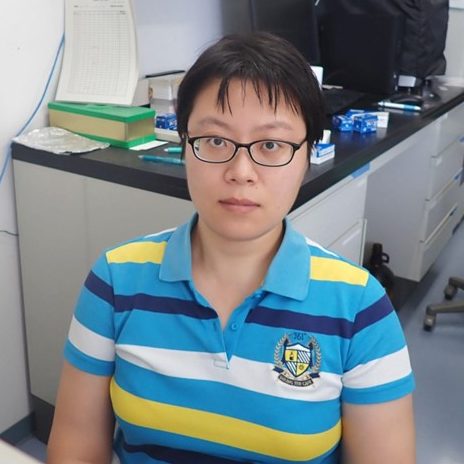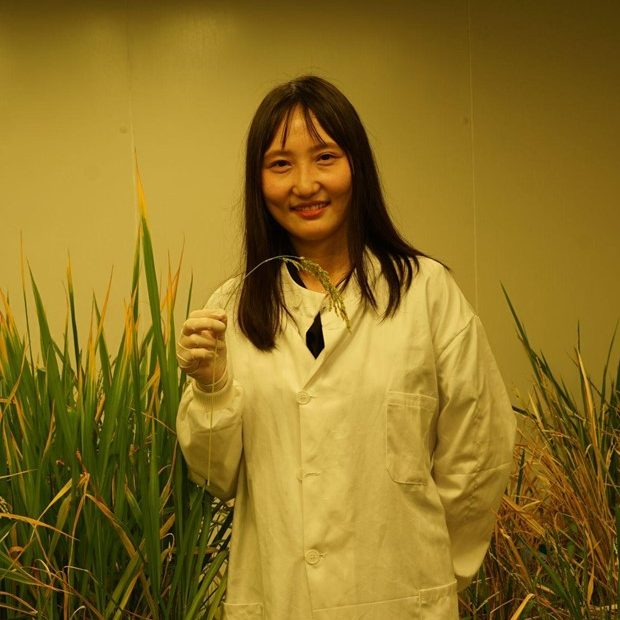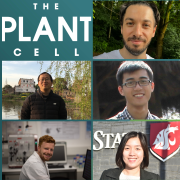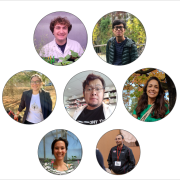The Plant Cell Features August First Authors
In the month of August, we published many groundbreaking manuscripts. Behind those manuscripts are researchers, professors, professionals and students dedicated to advancing the field of plant science. You’ve seen our First Authors on Twitter and Facebook— now, read more about why they chose to pursue plant sciences and click on the links to read their articles.
 Nitin Uttam Kamble
Nitin Uttam Kamble
Nitin Uttam Kamble (He/him) is the First Author of Initiation of B-type starch granules in wheat endosperm requires the plastidial α-glucan phosphorylase PHS1 published 18 August 2023. He is a Postdoctoral Scientist at John Innes Centre at Norwich Research Park, in Norwich, UK. Previously, Kamble earned a Ph.D in Seed Biology at the National Institute of Plant Genome Research (NIPGR), in New Delhi, India. He holds an M.Sc and B.Sc in Biotechnology from Savitribai Phule Pune University, in Pune, India. Research interest include starch metabolism and seed biology. Personal interests include playing badminton and Caroom.
Growing up in a small village in farming family in the state of Maharashtra, India, nurtured Kabmle’s fascination for plants and their significance in our lives. As he delved deeper into the world of science, the groundbreaking work of Dr. Norman Borlaug and his contributions to the green revolution further inspired and heightened Kamble’s awareness of the importance of plant science.
In the face of the ever-increasing impacts of climate change, our weather patterns have become erratic, with unpredictable periods of heavy rainfall and prolonged droughts. Witnessing the challenges farmers face in achieving successful crop yields and preserving their harvests, Kamble became deeply motivated to find sustainable solutions for long-term grain storage and utilization. This led him to pursue a Ph.D. at National Institute for Plant Genome Research (NIPGR) in New Delhi, under the guidance of Dr. Manoj Majee. During his doctoral research, his focus centered on unraveling the role of PIMT (Protein L-Isoaspartate Methyltransferase) in enhancing seed vigor and viability. This pivotal work aimed to understand the underlying mechanisms that influence seed quality, a critical factor in improving crop productivity and ensuring effective post-harvest storage. Following Kamble’s time at NIPGR, he embarked on an exciting new journey by joining the esteemed David Seung’s lab at the prestigious John Innes Centre in the United Kingdom. Here, Kamble immersed himself in the captivating world of starch metabolism. Leveraging the power of genetic resources, Kamble and his team’s mission is to modify starch to broaden its applications across various fields, including food and industry. Their ultimate aspiration is to develop starch variants that possess both broader utility and specialized characteristics to cater to diverse human and industrial needs.
 Rui Sun
Rui Sun
Rui Sun (she/her) is the First Author of Biosynthesis of gibberellin-related compounds modulates far-red light responses in the liverwort Marchantia polymorpha published 19 August 2023. She is currently a PhD Candidate at Kyoto University. In 2017, Sun earned an MSc in Life Sciences from Kyoto University and in 2015, a BSc in Biological Science from Peking University. Research interests include Plant hormone, development and evolution. Personal interests include reading novels. Sun is fascinated by the plasticity and diversity of developmental programs that plants adapted throughout evolution.
 Will Prall
Will Prall
Will Prall is the First Author of Pathogen induced m6A dynamics affect plant immunity published 23 August 2023. He is currently a PhD Student at University of Pennsylvania in the Department of Biology. Previously, he earned a BS in Biology from The College of New Jersey in 2010. Research interests include RNA Biology, Gene Expression, Co- and Post- Transcriptional RNA modification. Personal interests include cooking, sewing and education equity.
Prall became interested in plant science during undergraduate studies when a friend explained her research project. He later joined the lab and fell in love with research. Plants’ sessile nature confined them to evolve incredible biology to endure, react, and predict. What they have around and beneath them has resulted in incredibly fascinating biology. Prall has been lucky enough to be trained by legendary plant biologist, Dr. Scott Poethig, Dr. Doris Wagner, his advisor Dr. Brian Gregory, and Dr. Jeremy Bazin and Dr. Martin Crespi.
 Ying Zhu
Ying Zhu
Ying Zhu (she/her) is the First Author of The plant-unique protein DRIF1 coordinates with SNX1 to regulate membrane protein homeostasis published 30 August 2023. She holds a Ph.D in Biology from The Chinese University of Hong Kong. In 2016, Zhu earned a MSc in Crop Genetics and Breeding from Nanjing Agricultural University and in 2014 a BSc in Agronomy at Nanjing Agricultural University.Research interests include organelles biogenesis/development, protein trafficking and vacuolar function/trafficking. Personal interests include pilates, tennis, and gardening.
Zhu stepped into the field of plant science by obtaining a bachelor and master degrees in crop genetics and breeding at Nanjing Agricultural University. In 2016, she set sail on a Ph.D. journey at the Chinese University of Hong Kong under the supervision of Professor Liwen Jiang. SA+he focused on studying organelles biogenesis and protein trafficking in plants with accomplishments in the field. In this study, through suppressor screen of the FREE1 (FYVE domain protein required for endosomal sorting 1)-RNAi mutant, Zhu and team identified and characterized two sof (suppressor of free1) mutants, sof10 and sof641, with mutations in a plant-unique protein DRIF1 (DEAH and RING domain-containing protein as FREE1 suppressor 1). Their study revealed DRIF1 functions in orchestrating FREE1-mediated ILVs (intraluminal vesicles) formation of MVBs/PVCs (multivesicular bodies/ prevacuolar compartments) and vacuolar sorting of membrane proteins for degradation in plants.
 Chen Zhang
Chen Zhang
Chen Zhang (she/her) is the First Author of MYB24 orchestrates terpene and flavonol metabolisms as light responses to anthocyanin depletion in grape variegated berries published 30 August 2023. Zhang is a PhD student at Institute for Integrative Systems Biology, Universitat de València-CSIC. She earned a MSc in Pomology from Northwest A&F University in 2019 and a BSc in Horticulture from Northwest A&F University in 2016.Research interests include plant metabolism. Non-scientific interests include reading. The practical training classes at her university fostered and deepened Zhang’s interest in plant science.
Niu Jianqing
Niu Jianqing (he/his) is the First Author of Whole-genome sequencing of diverse wheat accessions uncovers the genetic changes during modern breeding in China and the United States published 30 August 2023. He is currently a Postdoctor at the Institute of Genetics and Developmental Biology, Chinese Academy of Sciences. In 2020, Jianqing earned a Ph.D in Genetics at Institute of Genetics and Developmental Biology, Chinese Academy of Sciences; in 2015, he earned a Msc in Crop genetics and breeding from China Agricultural University; And in 2013, he earned a BSc in Agronomy at Jilin Agricultural University. Research interests include wheat genomics and personal interests include running and reading. “It’s our duty to design better performance crops to feed the booming global population.,” said Jianqing.
 Qi Feng
Qi Feng
Qi Feng is a First Author of WD40 domain-containing protein Ehd5 positively regulates flowering in rice (Oryza sativa) published 30 August 2023. Feng is currently a Professor at the Center of Excellence in Molecular Plant Sciences, Institute of Plant Physiology and Ecology. Previously, Feng earned a Ph.D in Biochemistry and Molecular Biology at Shanghai Jiaotong University in 2010. In 1998, Feng earned a BSc in Biophysics at Fudan University.
Research interests include Plant genomics, Rice gene functional study and genome-assisted breeding. Personal interests include basketball and bamboo flute.
Feng has been closely associated with rice since childhood. After graduating from Fudan university, he participated in the International Rice Genome Sequencing Project and was involved in the sequencing of the rice Chromosome 4. Feng was honored to be the joint first author. Since then, he has been engaged in the research of plant genome, especially the research of rice re-sequencing and functional genes study. Feng has always maintained a love for rice, hoping to apply the basic research of rice to the field of breeding application, and hopes to continue to make efforts for rice research by means of rice genome-assisted breeding.
Xuening Zhang
Xuening Zhang (she/her) is a First Author of WD40 domain-containing protein Ehd5 positively regulates flowering in rice (Oryza sativa) published August 30 2023. She is currently a Student at University of Chinese Academy of Sciences, Beijing 100049, China. In 2023, she will earn a Ph.D in Genetics at University of Chinese Academy of Sciences, Beijing 100049, China. In 2016, Zhang earned a BSc in Horticulture at Shandong Agricultural University. Research interests include plant genetics and rice flowering. Personal interests include running and badminton.
She joined the Center of Excellence in Molecular Plant Sciences at the University of Chinese Academy of Sciences in 2016 for an integrated master’s and doctoral program. Zhang had the privilege of joining Professor Bin Han’s lab, where she focused on cloning and functional studies of genes related to rice yield and quality. Zhang and team performed γ-ray mutagenesis on the japonica variety “Tohoku IL9” and obtained a late-heading mutant. Using the Bulk Segregant Analysis (BSA) method, they successfully mapped the gene associated with the heading date, named Ehd5 (Early Heading Date 5), and conducted preliminary investigations into its molecular biological functions. In future studies, Zhang hopes to delve deeper into the molecular mechanisms of flowering time regulation in rice, providing new theoretical foundations for utilizing relevant genes in rice genetic improvement.









